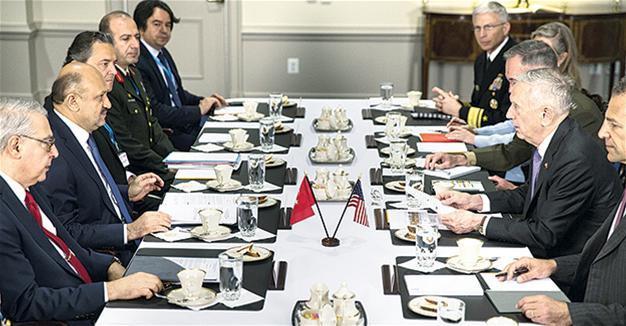Ankara offers new Raqqa plan to US excluding YPG
Cansu Çamlıbel – WASHINGTON

AA photo
Turkish Defense Minister Fikri Işık has paid a quick visit to Washington in order to propose a new plan over an operation to liberate Syria’s Raqqa from jihadists without making use of Syrian Kurdish People’s Protection Unit (YPG) forces.
Işık came to Washington on the grounds that Ankara’s message on the topic was not comprehended well enough by the new government after U.S. Secretary of State Rex Tillerson’s visit to Ankara two weeks ago.
Meeting U.S. Secretary of Defense James Mattis in Washington, Işık put forth a new plan for the liberation of Raqqa from Islamic State of Iraq and the Levant (ISIL) militants that does not comprise the Syrian Kurdish Democratic Union Party (PYD) and its military wing, the YPG, both of which Turkey regards as terrorist organizations due to their ties with the outlawed Kurdistan Workers’ Party (PKK).
Turkey and the U.S. are at odds over the designation of the YPG and PYD and despite Turkey’s efforts to designate the two groups as terrorists, the U.S. sees the Syrian Democratic Forces (SDF), which is mainly comprised of YPG forces, as effective partners on the ground in their fight against ISIL.
Speaking at a panel organized by the SETA Foundation for Political, Economic and Social Research after his meeting with Mattis, Işık said the meeting was a “friendly negotiation.”
“We have decided to continue working together on this matters,” said Işık, adding that this decision was made after both of the sides made their points to each other. “We will continue this work. Everything will be clear after this work,” he said, adding that deciding to continue working was “important.”
Turkey wants Ankara-backed Free Syrian Army (FSA) fighters to be used instead of YPG/PYD forces in a Raqqa operation. Up until today, the U.S. administration has been keen on using SDF forces around Raqqa.
Işık wanted to directly convey his message to Mattis because Turkey understood as though the U.S.
Department of State was almost sidelined by the new administration during any decision regarding the Raqqa operation and also because Turkey believed that Mattis was the best person to understand Turkey’s concerns regarding the PKK and PYD/YPG.
Işık told Mattis that the Raqqa operation “can be done together with the U.S.,” and that Turkey did not insist on conducting it alone.
Sources said Işık told Mattis that if the PYD/YPG is aided, then the Russian-Iranian influence in Syria would increase.
“There is no set decision for Raqqa; it is not easy to foresee a calendar,” said Işık at a meeting in the Turkish Embassy in Washington right before leaving for Turkey.
High-ranking Turkish officials, on the other hand, said the Raqqa operation did not appear set to be postponed until a later date by the U.S.
Turkey knows that there is only a small chance that the U.S. might change its mind on the Raqqa operation, sources said, but added that at least Turkey underlined the threats it perceives directly to Mattis.
